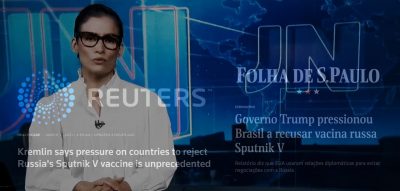Fallout: US Suppression of Russian Vaccine in Brazil Becomes Diplomatic Incident

All Global Research articles can be read in 51 languages by activating the “Translate Website” drop down menu on the top banner of our home page (Desktop version).
***
On Sunday March 14 2021, Brasil Wire published an exclusive story on how the United States pressured its ally, Brazil’s Bolsonaro regime, into rejecting Sputnik V, the world’s first approved Covid-19 vaccine, developed by Russia’s Gamaleya institute.
The story, by investigative journalist John McEvoy, was based on discovery of a report from the US Department of Health and Human Services, in which they boasted of combatting “malign Russian, Cuban and Venezuelan influence in Latin America”, through persuading governments to refuse offers of medical help, cooperation and technology transfer.
One of the success stories HHS referred to in the 2020 report, was that they had convinced Brazil not to purchase Russia’s Sputnik V vaccine. Another point of US pride was discouraging Panama, which has one of the region’s worst Covid-19 rates, from allowing Cuban doctors into the country to alleviate its own crisis.
US efforts to prevent Brazil deploying Sputnik V in its fight against the world’s second worst Covid-19 outbreak fit into a wider campaign of western propaganda against the vaccine, in which it was depicted as untested, unsafe and ineffective, due to its emergency rollout before the publication of stage 3 trial data.
Sputnik V
Sputnik V was approved for use in August 2020, and began to be offered globally, with Argentina, Venezuela, Palestine, Hungary, UAE, and Iran among the early takers of both the vaccine, and the technology to manufacture it. Medical journal the Lancet later reported that Sputnik V was safe, and had 92% efficacy against the virus.
Dr Julian Tang, clinical virologist, told the BBC:
“Despite the earlier misgivings about the way this Russian Sputnik V vaccine was rolled out more widely – ahead of sufficient Phase 3 trial data – this approach has been justified to some extent now. Such pandemic-related vaccine rollout compromises have, to be fair, been adopted in the UK vaccination programme also – with the extended intervals between the first and second doses. So we should be more careful about being overly critical about other countries’ vaccine designs.”
With Brazil’s death toll approaching 280,000, the new revelations triggered fresh public outrage that Brazil had wasted a golden opportunity to begin its vaccination campaign months earlier, and worse, that it was under duress from the Donald Trump administration.
It was a dead-eyed calculation by the US that denying Brazilians access to Sputnik V was a price worth paying for preventing a Russian soft power victory in the region. It is a decision which could well have caused the deaths of thousands of Brazilians.
Media furore
The day after publication, our story began to filter through to Brazilian and international media.
Independent platforms Brasil 247 and Revista Forum, and Russia’s RT, were followed by Brazil’s largest and most influential newspaper Folha de S.Paulo, which ran the story under the headline: “Trump Government pressured Brazil to reject Russian vaccine Sputnik V”. Folha was followed by Globo’s G1, and then, later that evening, TV Globo’s Jornal Nacional, the country’s flagship news bulletin ran its own segment based on the earlier Brasil Wire revelations:
“A report by the American government from the time when Donald Trump was president shows that the United States tried to persuade Brazil not to buy the Sputnik vaccine, developed by Russia. The document states that the Department of Health used diplomatic relations to combat what it called “the malign influences of countries like Cuba, Venezuela and Russia in Latin America.” Last week, the Brazilian government announced the purchase of ten million doses of the Russian vaccine, after governors in the Northeast negotiated another 37 million doses. Sought out by Jornal Nacional, the American Embassy declared that both it and United States consulates in the country never discouraged Brazil from accepting vaccines against Covid that were authorized by Brazilian regulatory bodies.”
Central to the US Embassy’s flimsy rebuttal of a story based on an official US Health and Human Services document, was that it specified that they never discouraged purchase of Anvisa approved vaccines. In the timeframe covered by the HHS report, there were no approved vaccines in Brazil at all.
Russia responds
By the following morning, the story began to appear across a range of international media platforms, and sparked a response from the Russian government.
“The Kremlin said on Tuesday that pressure on some countries to refuse to buy Russia’s Sputnik V vaccine against COVID-19 was at unprecedented levels, but that said such efforts had no chances of success. Kremlin spokesman Dmitry Peskov made the remarks when asked to comment on a U.S. government report which appeared to show that the United States had attempted to dissuade Brazil from buying Sputnik V. He said Russia was against politicising the situation around vaccines.”
As the story spread it was also revealed that Russian Premier Vladimir Putin had been in direct contact with former Brazilian President Lula, who held a remote meeting with the Russian Direct Investment Fund, in a personal effort to secure more vaccine doses for the country. Russia later agreed to send 37 million doses of Sputnik V, targeted for the north eastern region of Brazil, whose governors had fought a long legal battle with the federal government for the right to deploy such vaccines.
*
Note to readers: please click the share buttons above or below. Forward this article to your email lists. Crosspost on your blog site, internet forums. etc.
Featured image is from Brasil Wire

